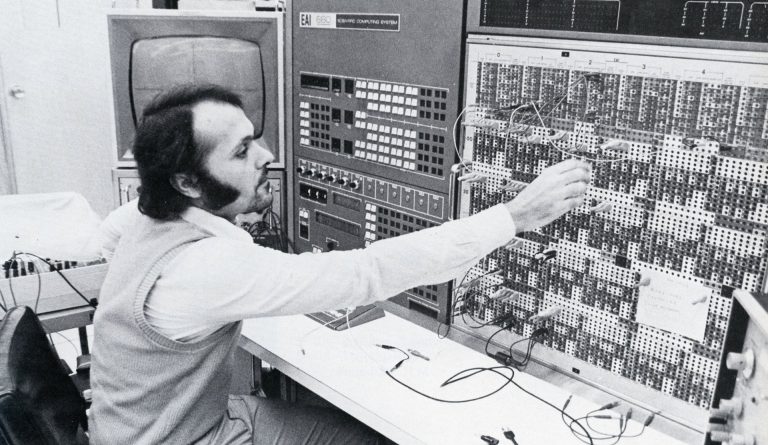Concordia celebrates 50 years of computer science teaching and research

In 1972, both the C programming language and the Pong videogame were released.
It was also the launch year of a small downtown Montreal computer science department with big dreams. Its vision helped shape Concordia’s Department of Computer Science and Software Engineering.
That fall at Sir George Williams University (SGW), one of Concordia’s two founding institutions, the Department of Computer Science in the Faculty of Engineering welcomed its first Bachelor of Computer Science cohort.
2022 marks the 50th anniversary of the department, which preceded even the creation of Concordia.
“Clair Callaghan started it all at SGW and hired Stanley Heaps to serve as the first department chair,” recalls Ching Yee Suen, professor and co-director of the Centre for Pattern Recognition and Machine Intelligence. “I was the first one hired from outside the university, and I started on September 1.”
 A research assistant, Christine Nadal, sits with analyst William Wong in 1990.
A research assistant, Christine Nadal, sits with analyst William Wong in 1990.
The merger
In 1974, Concordia University was born through the merger of Loyola College and Sir George Williams University. With the move, two departments consolidated within the Faculty of Engineering.
“The new Department of Computer Science now had one quarter of the faculty of engineering member count and one third of the course count,” says John William Atwood, distinguished professor emeritus. “Because of its significant footprint, the name of the faculty was changed to the Faculty of Engineering and Computer Science.“
The dual name still exists to this day as the Gina Cody School of Engineering and Computer Science.
Back in 1968, Loyola College’s Department of Computer Science started within its Faculty of Science, which also offered a major in the discipline.
“Historically, the Loyola department was the first computer science department in Montreal,” remembers Bipin Desai, professor of Computer Science and Software Engineering.
“I developed the first program. Despite its modest beginning, this founding department attracted a large number of students to Loyola.”
 Lata Narayanan: “For the past year, we have called the ER Building our home.”
Lata Narayanan: “For the past year, we have called the ER Building our home.”
Software engineering joins up
Since then, things have evolved at breakneck speed.
In 1998, the faculty introduced Quebec’s first program in software engineering as part of the computer science department. The program went on to be accredited by Engineers Canada’s Canadian Engineering Accreditation Board in 2002. This prompted the department to choose a representative name, and it officially became today’s Department of Computer Science and Software Engineering in 2004.
Come 2009, both the software engineering and computer science programs passed the accreditation process of the Canadian Information Processing Society.
As the department grew, it occupied many homes along the way.
“We first started in the Hall Building and then moved to the 10th floor of the Library Building when it was built,” says Lata Narayanan, current department chair.
“When the faculty occupied the EV Building, we joined them on the third floor. Now, for the past year, we have called the ER Building our home, where we occupy almost four entire floors — from the ninth to the 12th.”
Looking to the future
Narayanan is supported by two associate chairs, Weiyi Shang, associate professor, and Juergen Rilling, professor. Together, they lead a department that boasts more than 50 faculty, including:
- Yann-Gaël Guéhéneuc, professor and Canada Research Chair (Tier 1) in Empirical Software Engineering for the Internet of Things
- Tristan Glatard, associate professor and Canada Research Chair (Tier II) in Big Data Infrastructures for Neuroinformatics, co-director of the Concordia University Applied AI Institute
- Marta Kersten-Oertel, associate professor, head of Applied Perception Lab and scientific director of the Biomedical Science and Engineering Research Hub in Concordia’s School of Health
- Emad Shihab, associate professor, Concordia University Research Chair in Data Analytics for Software Systems, and associate dean of research and innovation
“The department recently started two new multidisciplinary programs in health and life sciences and in data sciences. We have welcomed new faculty to work in key strategic areas such as machine learning, computer networks and human computer interaction,” Narayanan shares.
“Despite the challenges of the pandemic, we continue to build momentum within our research and community. I am very optimistic about the future.”


